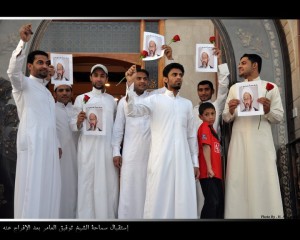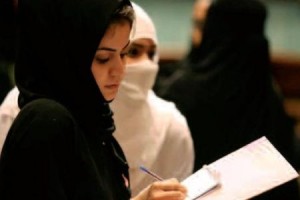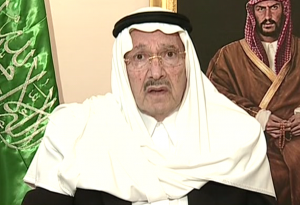In Riyadh the mood is tense; everyone is on edge wondering what will happen on Friday – the date the Saudi people have chosen for their revolution. The days building up to Friday so far have not been as reassuring as one would like.
On 4 March, there were protests in the eastern region and a smaller protest here in Riyadh. The protests in the eastern region were mainly to call for the release of Sheikh Tawfiq al-Amer, who had been detained after giving a sermon calling for a constitutional monarchy.
The protest in Riyadh was started by a young Sunni man, Mohammed al-Wadani, who had uploaded a YouTube video a few days before, explaining why the monarchy has to fall. After the protests, 26 people were detained in the eastern region and al-Wadani was taken in soon after he held up his sign near a major mosque in Riyadh.
It’s not just the people who are on edge; apparently the government is also taking this upcoming Friday seriously. Surprisingly, Sheikh Amer was released on Sunday, while usually political detentions take much longer.
All this week, government agencies have been issuing statements banning protests. First it was the interior ministry that promised to take all measures necessary to prevent protests. Then the highest religious establishment, the Council of Senior Clerics, deemed protests and petitions as un-Islamic. The Shura Council, our government-appointed pretend-parliament, also threw its weight behind the interior ministry’s ban and the religious decree of prohibition. But you can’t blame the clerics or the Shura for making these statements – the status quo is what’s keeping them in power and comfortable.
Saudis are now faced with a ban on any form of demonstration, and the blocking and censorship of petitions. Moreover, four newspaper writers who had signed one of the petitions are now suspended.
Saudis feel cornered, with little means of self-expression and at the same time exposed to news and opinions that only add salt to the wound. For example, Prince Talal Bin Abdul Aziz, the king’s half-brother, went on BBC Arabic TV to state his support for a constitutional monarchy and warn that anything less will lead to “evils” (his word).
Meanwhile, a newspaper reported that an expatriate was sentenced to 14 months in prison and 80 lashes for stealing part of a chicken from a restaurant. In response to the news, Abdulrahman Allahim, an award-winning Saudi human rights lawyer, tweeted that in his experience he had never come across a case in Saudi courts where a defendant was given a verdict of not guilty.
In Jeddah, a committee that has spent more than a year investigating the disappearance of millions of public funds assigned to the municipality to build a sewerage system has yet to make one formal accusation against anyone.
Another article revealed that the unemployment benefits recently decreed by the king have been whittled down from 3,000 riyals (£490) a month to 1,000 riyals (£165) and will probably only be given to unemployed men but not women.
The official unemployment rate of men is 10%, although many estimate it to be higher. The unemployment rate for women is yet to be officially announced but a study in 2010 estimated it at more than 26%.
It’s also estimated that about 60% of the population is under 30. These young, unemployed people live with many constrictions on their freedom. In addition to extreme gender segregation, single men are banned from entering shopping malls, and women cannot process their own papers, get a job or even access transport without male accompaniment and approval.
There’s no denying that the country is fertile ground for a revolution. However, I am concerned that the revolution might be hijacked by Islamists. Sa’ad al-Faqih, a London-based anti-monarchy activist, is claiming the revolution for himself. His TV programme, which is accessible via satellite in Saudi, is organising protest locations and revving up viewers to participate. Another contender is the new Islamic Umma party, whose founding members are imprisoned until they renounce their political aspirations (they have so far refused). Although the founding members are not free, the party’s online activity grows day by day. Both groups make use of a rhetoric that is dear to many average Saudis – attacking US foreign policy and the royal family’s misuse of the nation’s wealth while threading both issues within an Islamic theme.
On the other hand, the king is popular. All the petitions call for a constitutional monarchy, rather than the fall of the monarchy. Those who signed the petitions are mostly loyal to the king, but want access to decision-making and an end to corruption.
Also, many of the signatories are thinkers, writers and academics – generally an elite group of Saudis. From what I’ve read, nothing indicates they will go out to protest. However, one political activist who has been imprisoned several times for writing petitions was noticeably absent from recent lists of signatories. When a close friend of mine asked him why, he said, “now is not the time to sign petitions, now is the time to act”.
It’s very difficult to predict what will happen on Friday. My guess is that there will be protests. The larger protests will be in the eastern region and mostly by Shia Muslims. I also expect smaller protests in Riyadh and Jeddah. What tactics the security forces use will greatly influence not only the demonstrators but also the people watching from their homes. If undue violence is used against the demonstrators, it could possibly ignite the same fuse that led to full-blown revolutions in Tunisia, Egypt and Libya.
Whether or not it comes to that, we as a people have changed for ever. No longer do I see the frightened hushing of political discussion – everyone is saying what they believe and aspire for out in the open without fear. As Fouad Alfarhan, a prominent Saudi activist, tweeted:
“Probably not much will happen, however the biggest gain is the awareness raised in a large faction of our young people of their human and political rights in this post-Bouazizi world.”





















